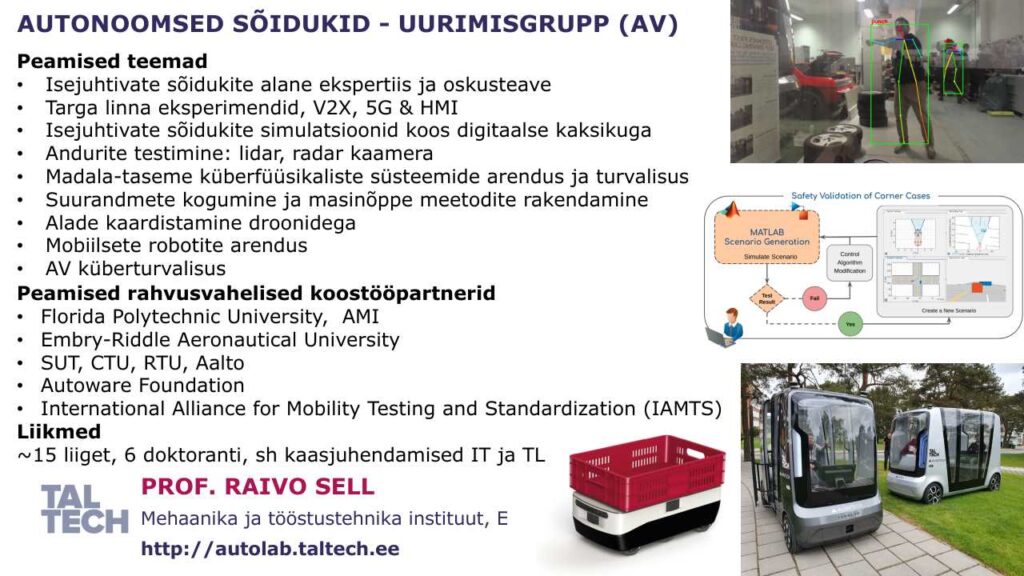Our research focuses on autonomous vehicles, industrial mobile robotics, and intelligent mobility systems integrated into a smart city test environment. We explore the full lifecycle of autonomous driving — from perception, decision-making, and control to simulation-based verification and validation (V&V), digital twins, and safety assurance.
Key activities include the development of self-driving shuttles and service robots for urban and industrial logistics, environment modeling and mapping using lidar and camera data, and the creation of realistic simulation frameworks for testing autonomous functions in both virtual and real-world conditions.
The broader vision is to establish the university campus as a living lab for future mobility — a small-scale smart city where autonomous vehicles, connected infrastructure, and intelligent control systems can be studied and validated. Our flagship project, the TalTech iseAuto, serves as a fully autonomous, open-source platform for research, education, and industry collaboration, supporting advancements in safe, reliable, and human-centered autonomous mobility.
Main focus areas:
- Scenario-based Simulation and V&V – requirements, safety, and performance validation through SIL/HIL workflows and field testing.
- Digital Twins and Co-simulation – integrated vehicle–environment–infrastructure models synchronized in real time.
- Perception and Sensor Fusion – combining LiDAR, camera, radar, and GNSS/IMU data for robust object detection and environment understanding.
- HD Mapping and Localization – dynamic maps, SLAM, and lifecycle management of map data.
- Planning and Control – safe trajectory generation, model-predictive control, and fail-operational architectures.
- Edge AI and Real-time Optimization – model quantization, accelerated computing, and energy-aware processing.
- V2X and Smart Networks (5G/6G) – connected mobility, infrastructure-assisted autonomy, and networked robotic systems.
- Living Lab and Smart City Testbeds – TalTech campus-scale pilots, metrics, and reusable validation scenarios.
- Human-in-the-Loop Systems – user experience, teleoperation, supervision, and modeling of human behavior in automated mobility.
- Cybersecurity and Safety Assurance – risk modeling, safety cases, and resilience of critical autonomous systems.
- Autonomous Logistics and Service Robots (AMR/AV) – last-mile delivery, fleet coordination, and warehouse automation.
- Cross-domain UAV/UGV Coordination – air-ground interoperability, multi-agent sensing, and validation frameworks.
- Data Management, Synthetic Data and MLOps – dataset generation, pipelines, explainability, and auditability of AI models.
- Education and Competence Development – micro-degrees, MOOCs, and open learning materials in autonomous systems and IoT.
Research consortium membership
Autonomous Vehicle Verification Consortium
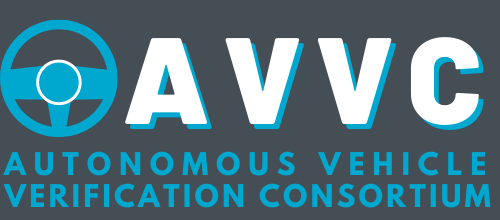
An Open-Source environment for validation and verification of autonomy. ACCV is hosting a PolyVerif framework which is an open-source validation and verification framework for autonomous vehicles. The framework integrates open-source components such as Autoware, Scenic, and simulator within an overall Design for Experiment structure. PolyVerif also provides multiple pathways (drone, ground, etc) to build digital twin capability into the simulation environment. PolyVerif provides extensive API access to introduce noise models for sensors, GPS, perception, and path planning functions. Sponsored by Florida Polytechnic University, the PolyVerif framework’s objective is to provide a highly functional research platform. Finally, the platform provides access to maintenance and consulting services through a third-party for industrial clients.
Autoware Foundation
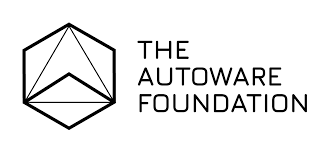
The Autoware Foundation (AWF), the open alliance for autonomous driving technology, welcomed 8 companies in the past quarter from all over the world, including Taiwan, Japan, India, Estonia and the US. Since the establishment of the AWF in December 2018, the AWF has made significant efforts to build a genuinely open alliance community for self-driving intelligent mobility for everyone. With our mission – initiate, grow, and fund Autoware projects – in mind, we will continue our exciting journey with 40 members.
“Autoware is a true leader in open-source autonomous driving software, and TalTech is excited to join Autoware Foundation. Thanks to Autoware, our joint team were able to build a Level 4 AV shuttle ISEAUTO in one year – an achievement which would never be possible without Autoware. Our team, academic staff, and students are eager to contribute to Autoware and ROS2 development to make autonomous driving smarter and safer. The collaboration matters most, and the open-source automotive solution is the best way to go.”
— Raivo Sell, Head of Autonomous Vehicles Lab, Tallinn University of Technology (TalTech)
The International Alliance for Mobility Testing & Standardization (IAMTS)
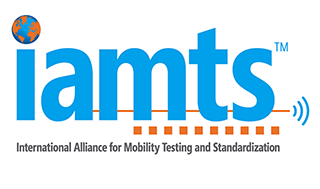
IAMTS is an SAE ITC (Industry Technologies Consortia) program. The SAE ITC team specializes in establishing and managing consortia by providing proven processes, tools and resources. ITC enables public, private, academic and government organizations to connect and collaborate in neutral, pre-competitive forums, thus empowering the setting and implementation of strategic business improvements in highly engineered industries globally.
Open position
Open Ph.D position
Currently no open positions in our group.
Guest researchers and fellows
We are accepting researchers and Ph.D. and master’s students to work in our lab for short- or long-term visits. Erasmus and exchange students are welcome, as well as post-docs and master’s students on semester projects.
In the case of interest, please review our ongoing projects and research background first.
Necessary competence:
- Basic knowledge of mechanical engineering, electronics, and software development
- Advanced knowledge of electrical engineering or computer science
- Practical experience with ROS, ROS2, or embedded systems
Defended doctoral thesis
- Cybersecurity Testing and Attack Propagation Analysis of Autonomous Driving Software. Roberts, Andrew James 25.06.2025
- Advancement in Perception Capabilities for Autonomous Vehicles: From Dataset Collection to Scene Interpretation. Gu, Junyi 06.11.2024
- Cyber-Physical Control System for Self-Driving Vehicles. Pikner, Heiko 03.09.2024
- Scenario-based Validation of Safety and Performance of an Autonomous Vehicle by a Software in Loop Simulation Method. Malayjerdi, Mohsen 09.10.2023
- Advanced Autonomous Vehicle’s Functions for Safety Improvements in Urban Mobility Context. Malayjerdi, Ehsan 29.08.2022
- Modelling and Simulation of Autonomous Vehicles and Systems and Their Advanced Control Methods. Pedai, Andrus 02.02.2021
- Hyperspectral Signatures of Military Objects in Battlefield, Radiation Field, and Information Field Integrated Model. Jürise, Martin 05.11.2020
- Energy Efficiency Evaluation Method for Mobile Robot Platform Design. Väljaots, Eero 30.03.2017
- Laboratory as a Service – A Holistic Framework for Remote and Virtual Labs. Seiler, Sven 16.11.2012
Journal Papers
2025
Razdan, Rahul; Sell, Raivo; Akbas, M. Ilhan; Menase, Mahesh (2025). Perspectives on Safety for Autonomous Vehicles. Electronics, 14 (22), 4500. DOI: https://doi.org/10.3390/electronics14224500.
Petritshenko, A., Sell, R., Kase, K. (2025). Drop-Out Reduction of Engineering Curriculum by Implementing CDIO Principles to Natural Science Studies. In: Auer, M.E., Rüütmann, T. (eds) Futureproofing Engineering Education for Global Responsibility. ICL 2024. Lecture Notes in Networks and Systems, vol 1261. Springer, Cham. https://doi.org/10.1007/978-3-031-85649-5_38
Sell, R; Czekalski, P; Lipka, L; Berkolds, K; Nikitenko, A; Kuaban, G; Tokarz, K (2025). An international hands-on IoT education platform towards Industry 5.0. Proceedings of the Estonian Academy of Sciences, 74 (2), 198−204. https://doi.org/DOI: 10.3176/proc.2025.2.21
Kalda, K.; Koskinen, K. M.; Sarv, L.; Sell, R. (2025). Situational awareness in autonomous shuttle buses. Proceedings of the Estonian Academy of Sciences, 74 (2), 212−216. DOI: https://doi.org/10.3176/proc.2025.2.23
Sell, Raivo; Razdan, Rahul; Kase, Kart; Rüütmann, Tiia (2025). The Role of AI Chatbots in Engineering Education: Experimental Findings and Implementation Strategies. International Journal of Engineering Pedagogy (iJEP), 15 (5), 4−19. DOI: https://doi.org/10.3991/ijep.v15i5.56681
2024
Udal, A.; Sell, R.; Kalda, K.; Antov, D. A Predictive Compact Model of Effective Travel Time Considering the Implementation of First-Mile Autonomous Mini-Buses in Smart Suburbs. Smart Cities 2024, 7, 3914-3935. https://doi.org/10.3390/smartcities7060151
Gu, J., Bellone, M., Pivonka, T., Sell, R. CLFT : camera-LiDAR fusion transformer for semantic segmentation in autonomous driving, IEEE Transactions on Intelligent Vehicles (2024). https://doi.org/10.1109/TIV.2024.3454971
Malayjerdi, Mohsen, Raivo Sell, Ehsan Malayjerdi, Mustafa İlhan Akbaş, and Rahul Razdan (2024). Real-Life Experiences in Using Open Source for Autonomy Applications Engineering Proceedings 79, no. 1: 19. https://doi.org/10.3390/engproc2024079019
Pikner, Heiko; Sell, Raivo; Malayjerdi, Ehsan (2024). Level 4 Commercial Autonomous Vehicle Control System Transition to an Open-Source Solution. Proceedings of the Estonian Academy of Sciences, 73 (2), 124−133. DOI: Malayjerdi, Mohsen, Raivo Sell, Ehsan Malayjerdi, Mustafa İlhan Akbaş, and Rahul Razdan (2024). Real-Life Experiences in Using Open Source for Autonomy Applications Engineering Proceedings 79, no. 1: 19. https://doi.org/10.3176/proc.2024.2.05.
2023
M. Malayjerdi, Q. A. Goss, M. İ. Akbaş, R. Sell and M. Bellone, A Two-Layered Approach for the Validation of an Operational Autonomous Shuttle, in IEEE Access, vol. 11, pp. 89124-89137, 2023, doi: 10.1109/ACCESS.2023.3306602.
R. Razdan, M. İ. Akbaş, R. Sell, M. Bellone, M. Menase and M. Malayjerdi, PolyVerif: An Open-Source Environment for Autonomous Vehicle Validation and Verification Research Acceleration, in IEEE Access, vol. 11, pp. 28343-28354, 2023, doi: 10.1109/ACCESS.2023.3258681.
Gu, Junyi; Lind, Artjom; Chhetri, Tek Raj; Bellone, Mauro; Sell, Raivo (2023). End-to-End Multimodal Sensor Dataset Collection Framework for Autonomous Vehicles. Sensors, 23 (15), #6783. DOI: 10.3390/s23156783.
Roberts, Andrew; Marksteiner, Stefan; Soyturk, Mujdat; Yaman, Berkay; Yang, Yi (2023). A Global Survey of Standardization and Industry Practices of Automotive Cybersecurity Validation and Verification Testing Processes and Tools, Sae International Journal of Connected and Automated Vehicles, 7 (2), #12-07-02-0013. DOI: 10.4271/12-07-02-0013.
2022
Malayjerdi, Ehsan; Sell, Raivo; Malayjerdi, Mohsen; Udal, Andres; Bellone, Mauro (2022). Practical path planning techniques in overtaking for autonomous shuttles. Journal of Field Robotics, 39 (4), 410−425. DOI: 10.1002/rob.22057.
Pikner, H.; Sell, R.; Majak, J.; Karjust, K. (2022). Safety System Assessment Case Study of Automated Vehicle Shuttle. Electronics, 11 (7), 1162. DOI: 10.3390/electronics11071162.
Gu, J.; Bellone, M.; Sell, R.; Lind, A. (2022). Object Segmentation for Autonomous Driving Using iseAuto Data. Electronics, 11 (7), #1119. DOI: 10.3390/electronics11071119.
Kalda, K.; Pizzagalli, S.-L.; Soe, R.-M.; Sell, R.; Bellone, M. (2022). Language of Driving for Autonomous Vehicles. Applied Sciences, 12 (11), #5406. DOI: 10.3390/app12115406.
2021
Caltagirone, L.; Bellone, M.; Svensson, L.; Wahde, M.; Sell, R. (2021). Lidar-Camera Semi-Supervised Learning for Semantic Segmentation. Sensors, 21 (14), #4813. DOI: 10.3390/s21144813.
Sell, R.; Pikner, H.; Majak, J.; Karjust, K. (2021). Multi-layer cyber-physical control method for mobile robot safety systems. Proceedings of the Estonian Academy of Sciences, 70 (4), 383−391. DOI: 10.3176/proc.2021.4.03.
Sell, R.; Malayjerdi, M.; Malayjerdi, E.; Baykara, B. C. (2021). Autonomous vehicle safety evaluation through a high-fidelity simulation approach. Proceedings of the Estonian Academy of Sciences, 70 (4), 413−421. DOI: 10.3176/proc.2021.4.07.
Kalda, K.; Sell, R.; Soe, R. M. (2021). Use case of Autonomous Vehicle shuttle and passenger acceptance analysis. Proceedings of the Estonian Academy of Sciences, 70 (4), 429−435. DOI: 10.3176/proc.2021.4.09.
2020
Sell, R.; Soe, R.-M.; Wang, R.; Rassõlkin, A. (2020). Autonomous Vehicle Shuttle in Smart City Testbed. In: Zachäus C., Meyer G. (Ed.). Intelligent System Solutions for Auto Mobility and Beyond. (143−157). Springer, Cham. (Lecture Notes in Mobility). DOI: 10.1007/978-3-030-65871-7_11.
Wang, R.; Sell, R.; Rassõlkin, A.; Otto, T.; Malayjerdi, E. (2020). Intelligent Functions Development on Autonomous Electric Vehicle Platform. Journal of Machine Engineering, 20 (2), 114−125. DOI: 10.36897/jme/117787.
Udal, Andres; Jürise, Martin; Kaugerand, Jaanus; Sell, Raivo (2020). COMSPECT: A compact model for green vegetation reflection spectra in 400 – 900 nm wavelength range. Proceedings of the Estonian Academy of Sciences, 69 (4). 10.3176/proc.2020.4.01
Sell, R.; Leier, M.; Rassõlkin, A.; Ernits, J.-P. (2020). Autonomous Last Mile Shuttle ISEAUTO for Education and Research. International Journal of Artificial Intelligence and Machine Learning, 10 (1), 18−30.10.4018/IJAIML.2020010102.
Sell, R.; Rassõlkin, A.; Wang, R.; Otto, T. (2019). Integration of autonomous vehicles and Industry 4.0. Proceedings of the Estonian Academy of Sciences, 68 (4), 389−394. 10.3176/proc.2019.4.07.
2010-2019
Sell, R.; Väljaots, E.; Pataraia, T.; Malayjerdi, E. (2019). Modular smart control system architecture for the mobile robot platform. Proceedings of the Estonian Academy of Sciences, 68 (4), 395−400. 10.3176/proc.2019.4.08.
Väljaots, E.; Sell, R. (2019). Energy efficiency profiles for unmanned ground vehicles. Proceedings of the Estonian Academy of Sciences, 68 (1), 55−65.10.3176/proc.2019.1.04.
Rassõlkin, A.; Sell, R.; Leier, M. (2018). Development case study of the first Estonian self-driving car, ISEAUTO. Electrical, Control and Communication Engineering, 14 (1), 81−88.10.2478/ecce-2018-0009.
Sell, Raivo; Petritsenko, Andres (2013). Early design and simulation toolkit for mobile robot platforms. International Journal of Product Development, 18, 2, 168−192.10.1504/IJPD.2013.053499.
Sell, Raivo; Seiler, Sven (2012). Improvements of Multi-disciplinary Engineering Study by Exploiting Design-centric Approach, Supported by Remote and Virtual Labs. International Journal of Engineering Education, 28 (4), 759−766.
Sell, Raivo; Leomar, Priit (2010). Universal Navigation Algorithm Planning Platform for Unmanned Systems. Solid State Phenomena, 164, 405−410. 10.4028/www.scientific.net/SSP.164.405
SAE Edge Report contribution
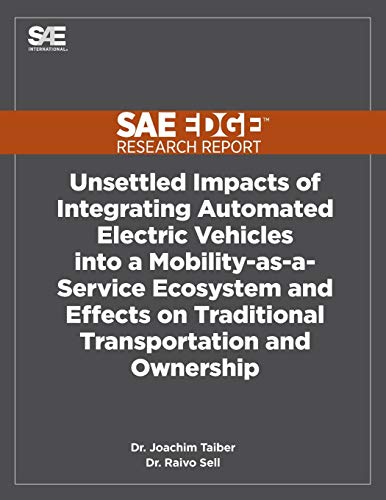
Razdan,R.; Sell,R.; Tino,C.; Schmidt,B.; Akbas,M.; Cherian,J.; Boer,N. (2020).
Unsettled Topics Concerning Autonomous Public Transportation Systems. SAE Technical Paper Series
Razdan, R.; Mahoney, W.; Haritan, E.; Kalia, A.; Smith, J.; Zarola, T.; Akbas, I.; Taiber, J.; Straub, E.; Sell, R. (2020).
Unsettled Topics Concerning Automated Driving Systems and the Development Ecosystem. SAE Technical Paper Series.
Razdan, R.; Lumina, J.; Balachandran, A.; Cheng, C.; Sreenivas, S.; Fernando, X.; Taiber, J.; Kalia, A.; Keel, N.; Zuby, D.; Krishnan, K.; Langer, D.; Sell, R. (2019).
Unsettled Technology Areas in Autonomous Vehicle Test and Validation. SAE Technical Paper Series.10.4271/EPR2019001.
Taiber, J.; Sell, R.; Shorten,R.; Kraus, A.; Baxter, D.; Grosse, R.; Pfliegl, R.; Martin,J.; Yager, M.; Kelley, S.; Kramer, H.; Bonomi, F. (2019).
Unsettled Impacts of Integrating Automated Electric Vehicles into a Mobility-as-a-Service Ecosystem and Effects on Traditional Transportation and Ownership. SAE Technical Paper Series.10.4271/EPR2019004.
Links
Raivo Sell ORCID iD https://orcid.org/0000-0003-1409-0206
